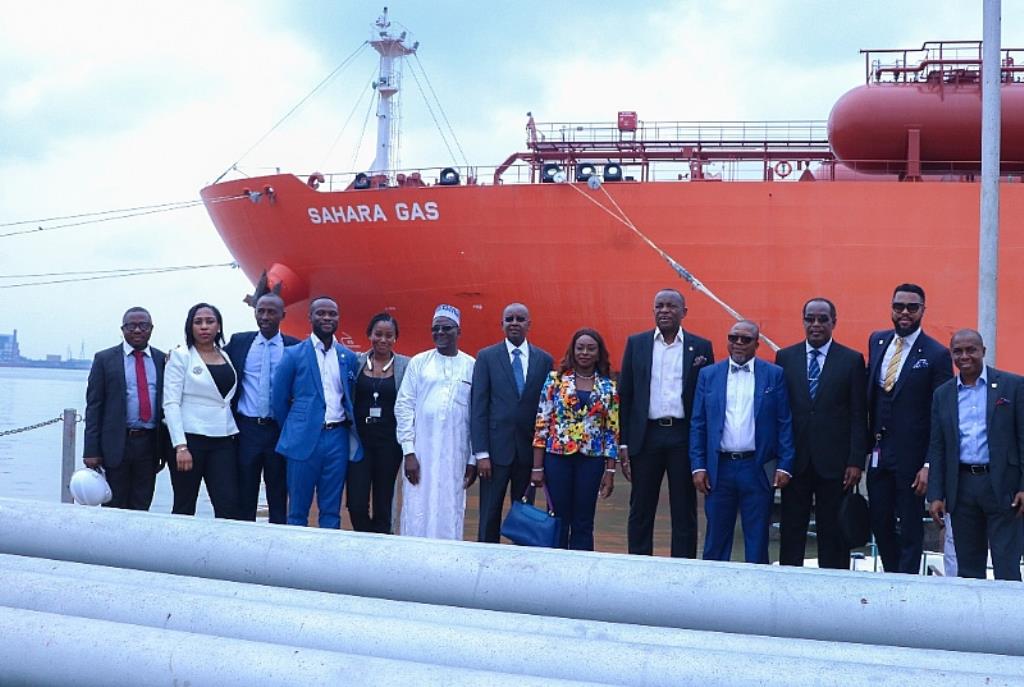Energy
Sahara Group Shares Three-pronged Net Zero Plan In 2023 Sustainability Report

Strategic investment in gas assets and infrastructure, Integration of Renewable Energy, and Emissions Reduction through Nature-Based Solutions are the tripod strategies poised to drive Sahara Group’s net zero plan going forward.
This was revealed by its Director, Governance and Sustainability, Ejiro Gray, during the launch of the energy conglomerate’s 2023 Sustainability Report, titled, “Dimensioning the Energy Transition: Path to Net Zero”.
According to Gray, the three-pronged strategy reinforces Sahara’s commitment towards a more sustainable future, with 2060 as the net zero target for Sahara’s operations across Africa, Asia, Europe, and the Middle East.
ALSO READ: Aradel Holdings Admitted To NGX’s Main Board, Boosts Market Capitalization By N3.05 Trillion
“This sustainability report underscores our steadfast commitment to addressing environmental, social, and governance (ESG) factors across our diverse operations along the energy value chain. As a business, we showcase a multifaceted strategy to minimise our environmental impact. This includes various initiatives to reduce greenhouse gas emissions, optimise energy efficiency, and responsibly manage resources,” she said.
She noted that the Sahara Group acknowledges the role of natural gas as a crucial bridge fuel and is already expanding investments in gas to ensure energy security while taking tangible steps towards reducing reliance on fossil fuels and contributing to a cleaner energy mix by launching pilot solar projects.
She noted that in pursuit of emissions reduction, Sahara Group embraced nature-based solutions through investments and partnerships in reforestation and conservation projects.
“Our partnership with Treedom exemplifies this commitment, with the planting of 2,000 trees in Cameroon and Kenya expected to absorb a substantial 900,000 tonnes of CO2 over the next decade,” she added.
The Sahara Group’s path to net-zero emissions has been tiered into distinct phases. In the short term (2022-2030), the focus will be on reducing carbon footprint through initiatives like fleet electrification, cycling programs, and energy efficiency measures. In the medium term (2031-2040), Sahara will look to further diversify its energy portfolio and increase investments in renewable energy projects. Ultimately, the goal is to achieve net-zero emissions by 2060 through offsetting any remaining emissions through nature-based solutions and other carbon reduction initiatives.
On his part, Head, Corporate Communications, Sahara Group, Bethel Obioma, pointed out the report’s comprehensive scope, which encompasses various affiliates within the Sahara Group, including Asharami Energy, Sahara Trade, Asharami Synergy, Egbin Power, First Independent Power Limited, Ikeja Electric, and the Sahara Group Foundation.
Obioma said Sahara’s upstream operations recorded reduction in carbon footprint and exceptional host community relations which led to the implementation of impactful projects focused on enhancing livelihoods, education, and healthcare.
“Launching our Gas to Power project, providing 24-hour electricity to the Ajoki Community in Edo State—a first-of-its-kind initiative, achieving ISO 20400 certification for sustainable procurement and recording a remarkable 3 million Lost Time Injury (LTI) free man-hours, underscores our dedication to both social impact and operational safety,” he said.
He said Sahara also achieved successful outcomes from its midstream, downstream, and power businesses through substantial reductions in carbon emissions, focus on operational efficiency, and implementation of renewable energy sources and energy efficiency measures.
Energy
SNEPCo, Former MD Aiboni Win Energy Times’ Awards

The Shell Nigeria Exploration and Production Company (SNEPCo) has been named Major Oil Company of the Year for last year by a Nigerian publication, Energy Times.
Biztellers reports that this is in recognition of the company’s contributions to deep-water oil and gas development and the industry generally.
Energy Times also awarded the title of Amazon of Nigeria’s Oil Sector for 2024 to Elohor Aiboni, a former Managing Director of SNEPCo now on international assignment in Brunei.
The awards were presented to SNEPCo’s Senior Operations Manager, Bolanle Odunayo-Ojo, who represented the Managing Director, Ronald Adams at a ceremony attended by key stakeholders in the oil and gas sector.
ALSO READ: BREAKING: Again, Dangote Cuts Petrol Price To N835 per Litre
“We are honored to receive the recognitions for the company and our former Managing Director as they underscore our dedication to excellence in the upstream sector,” Bolanle stated. “The modest achievements are result from teamwork and support by our partners, particularly the Nigerian National Petroleum Company Limited and regulatory agencies. The awards encourage us to continue to work together to power progress and innovation in Nigeria’s energy landscape.”
The SNEPCo has been a pioneer in Nigeria’s deep-water oil and gas production since it began production from Bonga in 2005, Nigeria’s first deep-water well. Gas from Bonga is also piped to Nigeria Liquefied Natural Gas Company Limited at Bonny Island. SNEPCo’s operations have led to significant discoveries, including Bonga Southwest in 2001 and Bonga Northwest, which began production on August 5, 2014.
In its award, the Board of Directors of Energy Times pointed to the continuing success of Bonga, notably production of the 1 billionth barrel of oil in February 2023 and the recent Final Investment Decision on the $5 billion Bonga North project.
The award on Aiboni’s highlights a career that has seen her serve in various business and leadership roles within and outside Nigeria. She was appointed Managing Director of SNEPCo in 2021 and led initiatives that deepened operational efficiency, local content development and social investment projects across the six geopolitical zones in the country.
Energy
Shell Commends Oloibiri Lecture Series As Platform For Change

Shell Nigeria Exploration and Production Company Ltd (SNEPCo,) one of the sponsors of the Oloibiri Lecture Series and Energy Forum (OLEF) has commended it as a platform for driving change in Nigeria’s energy sector through the discussions that centre on business performance, cost discipline and process simplification.
“This event is special to the Shell brand, not only because of the nostalgia of Oloibiri but the quality of discourse it has enabled in our sector over the years,” SNEPCO Managing Director Ronald Adams said in a goodwill speech delivered by General Manager, Wells and Geosciences Operations Joe Mordi. He said: “We are grateful to the Society of Petroleum Engineers and our host the Petroleum Technology Development Fund (PTDF) for another successful outing.”
Organised by the Society of Petroleum Engineers (SPE) Nigeria Council, the Oloibiri Lecture Series and Energy Forum began in 1991, in commemoration of the country’s first commercial oil discovery by Shell at Oloibiri, Bayelsa State, in 1956. Ronald said recent developments in the Upstream and Downstream sectors of the energy industry, including the $5-billion final investment decision by Shell in the Bonga North Deepwater project echoed the sentiments around the first oil discovery.
ALSO READ: No Safety Guarantee For Unscheduled Visitors To Benue – Gov Alia
He noted that, “These strides come with a commitment to excellence required of us – for stakeholders, colleagues, our country and indeed, future generations. The theme for this year ‘Driving energy sustainability through technology, policy and supply chain excellence’ reflects this commitment. The future is bright, and we have the opportunity to co-create it.”
Energy
NLNG Improves Nigeria’s Domestic LPG Supply Efficiency

In line with its continuous improvement culture, the Nigeria LNG Limited (NLNG) will be working closely with its stakeholders to improve operational efficiency in its domestic Liquefied Petroleum Gas (DLPG) supply in Nigeria.
According to a statement from its General Manager, External Relations and Sustainable Development, Sophia Horsfall, this was highlighted at an engagement session with stakeholders in Lagos.
It was gathered that the NLNG plans to enhance engagement and improve operational efficiency of its LPG supply through digitalisation of some of its processes which include a new platform designed to streamline regulatory processes, optimise risk management, and enhance the buyer experience. The platform will feature IT-supported relationship management, automated issue resolution, centralised real-time payments, and improved case management systems, ensuring a seamless supply process despite market shifts and external pressures.
ALSO READ: Ifon-Ilobu Crisis: Adeleke Assures Of Quick Restoration Of Peace
Manager, Commercial Contract Management, NLNG, Tolulope Longe, reiterated that the planned improvements will enable and consolidate NLNG’s resolve to delivering 100% of its LPG supply to the Nigerian market.
She said a strategic roadmap was in play to ensure the achievement of NLNG’s longstanding goals of LPG being accessible and available in the country, aligning with its vision of being a globally competitive energy company, improving lives sustainably. She also harped on the significance of these improvement initiatives and the Company’s push for LPG utilisation as a clean energy source alternative to kerosene and other fossil fuels
Longe noted that the Company remained focused on growth and sustainability of the LPG market by continuously enhancing its supply processes in collaboration with offtakers. She stressed NLNG’s commitment to collaborating with stakeholders to maintain pricing stability and long-term market viability. While acknowledging industry concerns, she noted the importance of operational efficiency in meeting market demands.
NLNG aims to strengthen stakeholder engagement and improve market efficiency in the LPG sector through enhanced customer interactions, minimised schedule disruptions, timely confirmations and deliveries, and prioritisation of customers with demonstrable capacity. As it adapts to market realities, NLNG remains committed to driving sustainability and delivering lasting value to Nigerians.





















